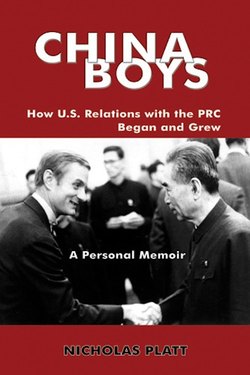Читать книгу CHINA BOYS: How U.S. Relations With the PRC Began and Grew. A Personal Memoir - Nicholas MD Platt - Страница 20
На сайте Литреса книга снята с продажи.
Meeting Generalissimo and Madame Chiang
ОглавлениеOne day that spring, while we were on the road with some tutors, an ornate invitation arrived at the school from the capital, Taipei, requesting the presence of Mr. and Mrs. Nicholas Platt at the annual garden party hosted by President and Madame Chiang Kaishek. The teachers were impressed and the students envious. How had this happened? Why were we singled out?
It turned out that my uncle Joseph H. “Sandy” Choate III had written a letter about us to Madame Chiang’s close confidant and assistant, Pearl Chen. Sandy was a lawyer in New York who for decades had managed the financial affairs of Chang Hsueh-liang, the notorious “Young Marshal.” Hsueh-liang, a Manchurian warlord turned Nationalist general, had made history by kidnapping Chiang Kai-shek at a hot spring near Xi’an in 1936. After surrendering himself and his boss, the Young Marshal was placed under house arrest for most of the rest of his life (he was released at age 89 in 1990). The Generalissimo did not touch Hsueh-liang’s private wealth. Under Sandy’s management his portfolio swelled.
The Chinese loved Sandy Choate. Huge (six feet five inches and 250 pounds), with a prominent nose and flaming red hair, patches of which covered his entire body, Sandy was everything the Chinese thought a foreign devil should be. Witty and smart, he made many friends during periodic contact with the Nationalists. Madame Chiang and Pearl were among them.
Sheila wrote home the authoritative account of this meeting:
When we arrived, tired and dirty, at the Embassy in Taipei, we found the invitation to tea with the Generalissimo and Madame Chiang waiting—very elegant and formidable. We had no proper clothes with us, of course (white gloves were necessary), but friends in Taichung kindly sent some up, and the whole school was in an uproar because the President’s office had called about the invitation! It turned out to be a very large tea indeed. We were all delivered in big black cars, and sorted out on arrival into categories: Diplomatic corps, A.I.D., U.S.I.S., and something called “Others.” We were “Others,” placed at the very foot of the line with some Fulbright professors. We all snaked through the residence and shook hands with Madame (fierce) and the Generalissimo (old and rosy) and then were herded to the “Others” tables in the garden. Soon, an elderly Chinese lady rushed up. She was Miss Pearl Chen, Madame’s American secretary for 28 years, who urged us to get something to eat. We did, whereupon she urged us to eat it. We did, in front of her eyes. Then she said, “Good, now I can go and tell Madame you have had something to eat,” and hotfooted it off to do so. We were walking around admiring the garden (lovely with fat pots of daisies, snapdragons, verbena, palms & Korean grass, all marvelous and healthy) when up panted Miss Chen, perspiring heavily, and said that Madame wanted to see us and would we please follow her, which we did, galloping after her through the surprised guests.
Madame and the G. were sitting in a pavilion, and we were charmingly greeted, seated on pillows, talked to, and given tea, while the Embassy people stood around with their eyes out on stalks. Needless to say, this was all due to Sandy, whom she really likes. She is expecting to see him when he comes out, asked fondly after him, and really made a royal fuss. We were impressed, charmed, and generally bowled over by all this, and really had a lovely time on the reddest carpet you’ve ever seen. The Generalissimo speaks no English, but we were able to murmur appropriate politenesses in Chinese to him, which was lucky. The crowning touch occurred on the way out. As the Madame and the Generalissimo made their way through the crowd, she said loudly to me, “Goodbye, Mrs. Platt,” which practically finished the Embassy people.4
An event of no substantive importance whatsoever, Sheila and I valued the encounter later. It made us one of the very few couples of our generation to have met Chinese leaders from both sides of the civil war, Zhou Enlai and Madame Mao in the People’s Republic of China, President and Madame Chiang Kai-shek in Nationalist Taiwan.
Another far more significant development in the diplomacy of China marked our time in Taiwan. General De Gaulle announced that France would recognize the Communist government in Beijing. Washington was dismayed, but my classmates and I gathered in the garden of our house in Taichung to offer a private toast to Le Grand Charles. The logjam of history was breaking.
Tying a loose end in our family history, we made a brief side trip from Taiwan to Kyoto, Japan, to reestablish the relationship with Joseph Hardy Neesima’s university. As a fifth-generation direct descendant of Alpheus Hardy, and the first family members to visit the Doshisha in more than fifty years, we were treated royally. The chancellor of the university, the president of the student body, and the head of the Alumni Association were waiting on the tarmac at the airport and whisked us in limousines to the college administrative offices. There, under a stained glass window depicting the clipper ship Wild Rover, we were asked to fill in the blanks in the family tree since the last visit two generations ago, a daunting task completed by my father, who came a month later. This was to be the first of many visits, and an important connection when fate later shifted our career path to Japan.
